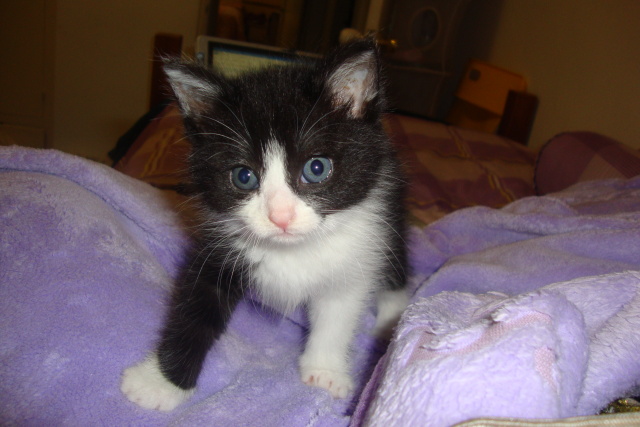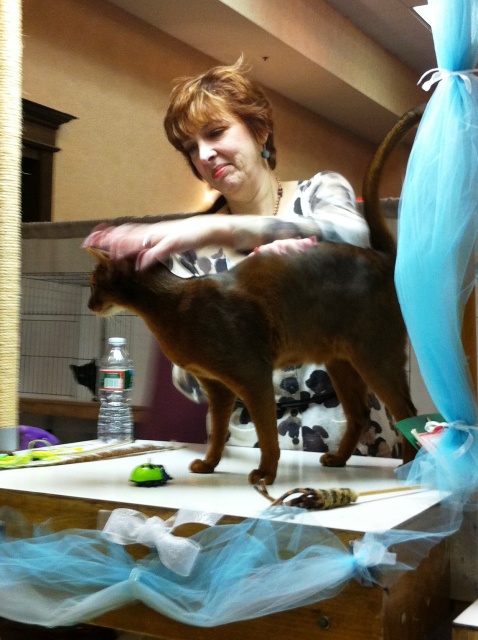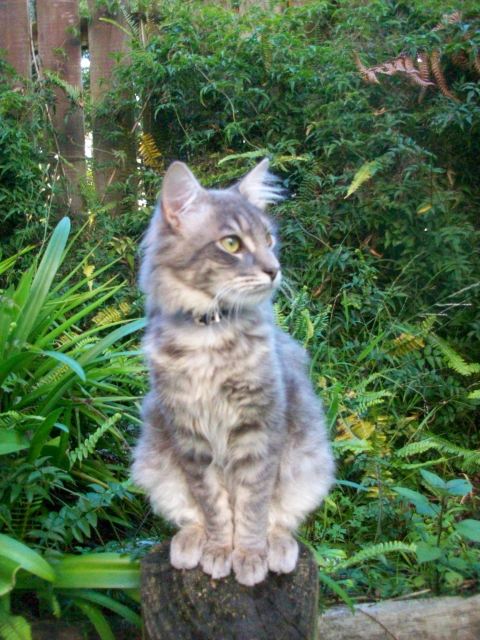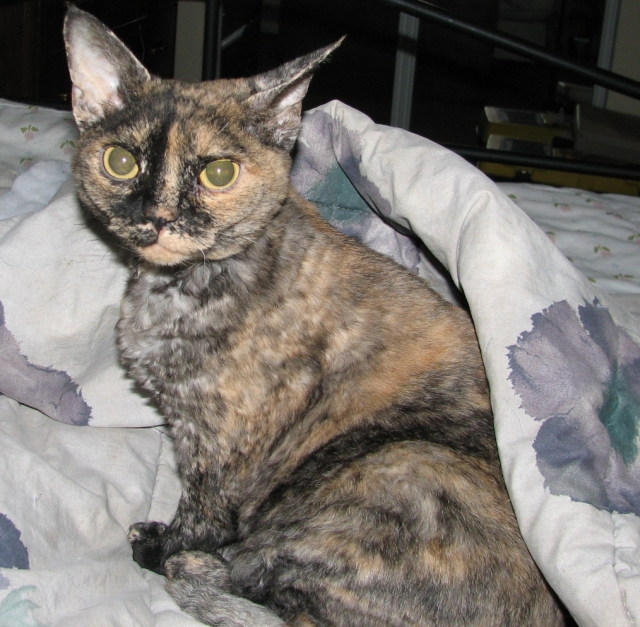QuestionAfter weaning how long does it take for breasts to go back to normal? My cats breasts are very large and hot, is this normal after a few days of the kittens being gone?
AnswerMichelle,
Breast milk is a supply and demand kind of commodity meaning that so long as there is a demand from kittens for milk there will be a supply for them to drink from their mom. This means that the kittens were not weaned when they were sent to live in their new adoptive homes. This is good information to pass along to the new adoptive families because kittens who have been separated from mom prior to being weaned can be somewhat insecure and will likely need some extra TLC to help them overcome the anxieties and other issues that often result from a premature separation from mom.
At this point your momma kitty is probably one unhappy camper - at the very least her mammary tissues are engorged (painfully swollen and filled with milk) and she's very uncomfortable. Unfortunately because the kittens weren't weaned there's a reasonably good chance that this momma cat either has or will develop a painful bacterial infection of the mammary glands called mastitis which is caused when milk isn't being emptied from the breasts of any nursing mammal mom (this can happen in cats, dogs, human moms and other mammals too).
When trying to assess how much pain a cat is in or how sick s/he is it's important to bear in mind that cats are instinctively hardwired to hide any sign of physical pain or illness as a means to protect themselves from predators which means that it can be difficult to accurately assess whether a cat is sick or in pain. In my opinion it's safe to say that whether mom is engorged or she has mastitis she is experiencing moderate to severe discomfort so she really should see a veterinarian as soon as possible, particularly if this little girl has a fever, her appetite has changed (most likely decreased), she's become sleepy/lethargic compared to her usual self or she's had any other significant behavioral changes in the time period since the kittens have been gone.
If momma kitty is simply engorged the vet can provide pain medication to help alleviate her discomfort, but there is a simple home remedy that you can apply to help further ease her discomfort in the absence of an infection. You can help to alleviate some of the discomfort she's feeling by applying warm compresses to her teats 3-4 times daily. You'll need a clean facecloth that's dampened with warm water - test the temperature on the inside of your wrist before applying the washclothes to mom because if they're too hot she will experience significant discomfort not only because mammary tissues are sensitive to begin with, but because she's engorged and may have a painful infection. You may notice during the application of warm compresses to mom's mammary glands that she lets down some milk (it's okay if she doesn't, but don't be surprised if she does).
If you notice that mom's milk is any color other than a fairly pure white, if the milk seems lumpy/curdled or if the milk has a foul smell to it then mom should be seen by a vet immediately because she has probably got a nasty case of mastitis and she will need at least one course of antibiotics to clear the infection in her mammary glands. While some veterinarians may not readily provide pain medication to a queen that's got engorged mammary glands or mastitis don't be afraid to request some medication to help ease her pain, the types of medications that would be prescribed for this aren't usually very expensive and please bear in mind that nursing human moms who develop mastitis or become engorged are routinely given pain medication to alleviate their discomfort and I'm of the belief that if we know for certain that a pet is experiencing pain they should be treated for that pain to ensure that they're as happy, healthy and comfortable as possible at all times. As I'm sure you can appreciate breast tissue is very sensitive - it's easy to see that having an infection in breast tissue would be very uncomfortable so ideally you'll want to have this little girl seen at the earliest time that your family vet can accommodate her.
Once your momma kitty has been assessed by your family vet her course of treatment can be determined. If she's got mastitis the antibiotics will clear the infection and her milk should dry up reasonably quickly - say within about 2 weeks or so. If your queen is simply engorged your vet may opt to give her antibiotics as a means of preventing mastitis, this isn't an uncommon practice. Because of the way that our current antibiotics work they don't differentiate between healthy bacteria such as those normally found in the digestive tract and nasty bacteria that cause infections so there's a possibility that your queen will get a nasty case of diarrea and she may even become a picky eater or lose her appetite while she's on antibiotics.
One good way to reduce the chances of these unpleasant side effects is to replace the good bacteria in mom's digestive tract by giving her 1-2 tablespoons of plain yogurt twice a day (you can give smaller doses of yogurt more frequently if her antibiotics are to be given more than twice a day). Generally I prefer to give my cats plain unsweetened organic yogurt, but regular plain yogurt works just fine if you prefer, just try to avoid those that use artificial sweeteners as cats don't typically tolerate chemical sweeteners very well. I usually don't recommend giving cats cow's milk since many cats don't tolerate the high levels of lactose present in cow's milk but yogurt is unique because the beneficial bacteria in yogurt actually digest the lactose breaking it down which means that yogurt is usually well tolerated by most cats.
Once your momma's milk supply has dried up completely and your vet has given her a clean bill of healthy she can be spayed to prevent any further contributions to pet overpopulation. Pet overpopulation is a very serious problem worldwide, millions of healthy unwanted cats, kittens and other pets are euthanized in shelters every year simply because there just aren't enough suitable adoptive homes to meet the demand of homeless pets. Spaying and neutering pets saves lives on a number of levels, these surgeries prevent unwanted pets from being born - they also reduce the likelihood of reproductive cancers and infections that can easily shorten the lives of our pets AND spayed/neutered pets are far less likely to develop behavioral issues that could result in them losing their homes or in some cases their lives. Spaying your queen will provide a number of positive benefits beyond the obvious - you will be significantly reducing the likelihood that she will develop breast or reproductive cancers, potentially serious behavioural issues that could cost her her home and/or her life and you will be completely preventing her from developing a potentially life threatening infection of the womb called pyometra which causes the uterine horns (a cat's uterus is Y shaped) to fill with pus. If a female cat has pyometra and her uterus ruptures infected material will seep throughout her abdomen causing a nasty infection called peritonitis which will cause excruciating pain/suffering and most likely prove fatal.
While it's quite common practice for people to separate kittens from their mothers anywhere from 4-8 weeks of age this is NOT actually what's best for the nursing queens or their kittens. If left to her own devices a queen will generally wean her babies completely by the time they're 9-10 weeks of age and after 10 weeks if she does still have any kittens nursing the amount of milk being produced would be fairly small and if the kittens had to be separated early from their mother she wouldn't likely develop mastitis or become engorged. It really is best overall for the long and short term benefits to keep the kittens with their mother until they're at least 12 weeks old - some kittens will mature more quickly than others and be ready to leave mom at 12 weeks or slightly before while other kittens will need some extra time with their mom to achieve proper social and developmental milestones.
In general while kittens CAN be separated from mom earlier than 12 weeks of age from the standpoint that they're capable of consuming a diet made up of solid food from 5-6 weeks of age forward this isn't necessarily an indication that kittens SHOULD be separated from their mother this early. Reputable breeders never separate kittens from their mom prior to 12 weeks of age because a mother cat is a kitten's absolute best teacher. In recent years animal behaviourists have begun to realize that kittens taken from mom prematurely, that is to say prior to 12 weeks of age are much more likely to have behavioural problems later in their development. I can provide you with further information about the normal social and developmental milestones of kittens if you're interested in learning more.
Under normal circumstances without having humans force the issue weaning is a very gradual process for a mother cat and her kittens meaning that mom's body has a chance to adapt to the diminishing demand for milk from her kittens and the kittens' bodies have a chance to adapt to their gradually increasing new diet of solid food and the slowly decreasing supply of mom's milk. Typically mom will begin to encourage her babies to eat solids around 4-5 weeks of age, however this does not mean that they are entirely weaned, in fact the kittens will continue to nurse for several weeks, sometimes up to 9-10 weeks of age in addition to gradually increasing their intake of solid foods. With a healthy momma kitty who is receiving appropriate quantities of food I see no reason to intervene in the natural process unnecessarily. Obviously since life is far from perfect sometimes unforeseen circumstances arise that mean kittens are weaned prematurely either by their mothers or in some cases they must be separated from their mom early for their own safety and in those cases they must be cared for under less than ideal circumstances. When it comes down to it breastfeeding really is best for baby mammals - breast milk provides important nutrients and antibodies that babies can't get anywhere else. Kittens who have been weaned too early are more likely to develop issues with their physical health because they're more susceptible to viral/bacterial infections. It's also not uncommon for kittens that have been prematurely weaned to fall behind in growth and weight gain.
In order to give these little ones the best possible shot in life they're going to need to start their kitten vaccines earlier than I'd normally recommend and it's really best if they're kept away from other cats until they've gotten those vaccines and their bodies have had a chance to respond to the vaccines and begin creating antibodies. In order to help the kittens avoid delays in their growth and/or weight gain I would recommend that the adoptive families consider supplementing their kittens' diets depending on their age. If the kittens are 8-10 weeks of age they really should have a weaning formula added to their food just to provide them with some extra nutrients that they may need to continue to grow and develop normally. If the little ones are 7 weeks of age or under then the little ones will do best getting extra nutrition, fat and calories added to their diet by having a kitten milk replacer added to their food. If you have any questions or concerns about the information that I've provided in this answer or you have any further cat related questions or concerns, please don't hesitate to contact me again - I'm more than happy to help you and your cat in any way that I can.

 Newborn Kitten feeding ---? 5-6 WEEKS
Question
Venus
Hello expert,
I have a 5-6 week kitten a
Newborn Kitten feeding ---? 5-6 WEEKS
Question
Venus
Hello expert,
I have a 5-6 week kitten a
 Best weight-loss plan for Abyssinians?
Question
Overweight Aby?
I have a year and 10 month old
Best weight-loss plan for Abyssinians?
Question
Overweight Aby?
I have a year and 10 month old
 Rain
Question
my cat
Hi, i was wondering if you could help m
Rain
Question
my cat
Hi, i was wondering if you could help m
 My cat is jealous of my other cat
QuestionQUESTION: Hi Ali. I hope you can provide
My cat is jealous of my other cat
QuestionQUESTION: Hi Ali. I hope you can provide
 cat disappeared
Question
pusscat at home
My cat came to me at 6 months
cat disappeared
Question
pusscat at home
My cat came to me at 6 months